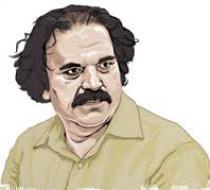Sambhaji Bhagat: Voice of Dissent Favorite
The Voice of Dissent
“I am not here to entertain you; I am here to disturb you. Those who are here for entertainment, I request them, please go.” It’s unusual, if not rare, for a live performer to begin by saying that to the audience. The compact of patronage that’s implicit is what Sambhaji Bhagat smashes right at the onset of his performance. For him, this art is a quest for the truth that will liberate the people he represents.
The 55-year-old Bhagat, the son of a Dalit cobbler from Panchgani in Maharashtra, started Lokshahiri (people's poetry/social poetry) when he joined college. He has used Maharashtra’s traditional and popular performance art to espouse social and political ideas that seek to change the status quo. While other Loksharirs have used the form to entertain people, Bhagat uses it to voice dissent and challenge the establishment.
We sing about our daily lives – the way we live, the way we are treated. We sing so that our people can lead better lives. We sing about the discrimination and exploitation that happens every day. We sing for change. “We’re a dead people. We no more unite and raise our voice against oppression, be it by class, caste or government. This state was once the epicentre of so many great movements, the social reform movement in the 19th century, the communist and feminist movements in the 1970s and ’80s. It feels sad that people today choose to remain silent,” says Bhagat.
He has been performing for over three decades now and started out with performances in colleges, mills and the slums of Mumbai. Today his troupe, which has less than ten people, travels across Maharashtra with songs that about the condition of Dalits. “We sing about our daily lives – the way we live, the way we are treated. We sing so that our people can lead better lives. We sing about the discrimination and exploitation that happens every day. We sing for change,” he explains.
The lyrics, sung in the pahadi dialect of Marathi, are the most crucial aspect of Lokshahiri. And to ensure that the words and the message they impart remain front and centre, the music used is fairly simple. The instruments are minimal – so there’s a harmonium accompanied by a pair of dholkis or tablas (percussion instruments) for rhythm. The songs have a repetitive chorus and an energetic beat that make them catchy.
In the 80s, this art form was very popular among people. But in the 90s, television’s grip on popular imagination saw audiences fall drastically. However, there has been a revival of sorts recently with big performances drawing as many as 30,000 people.
It would be wrong for me to say that my songs can alone help the suppressed. Art plays an important role, but along with it, we need a people’s movement. And that is what we are trying to do. We are trying to make people aware so that we can together strive for change.
Bhagat is also a teacher and playwright. Shivaji Underground in Bhimnagar Mohalla and Mumbai 17 are two of his famous award-winning plays. While the former depicts Chhatrapati Shivaji as a hero of the downtrodden, the latter showcases life in the slums of Mumbai. “Whatever money we get from these lokshahiri jalsas, we invest it in our productions. Theatre and street plays are other ways to reach out to the people. My dream is to have our own media platforms – a radio station, a TV channel that will help us reach an even wider audience,” Bhagat says.
While Bhagat enjoys the art he knows his songs alone cannot bring about long-lasting social change. “It would be wrong for me to say that my songs can alone help the suppressed. Art plays an important role, but along with it, we need a people’s movement. And that is what we are trying to do. We are trying to make people aware so that we can together strive for change.”
Bhagat was arrested for the first time as a student for singing in front of workers in Chandrapur in Ballarshah district of Maharashtra. Once released, he went back to singing, undeterred by the incident. Since then, he has been arrested on several other occasions for practicing his art.
National-award winning film, Court, uses Sambhaji Bhagat’s music and a little bit of his life experience. Here is song written and sung by Bhagat for the movie. (The performer in the video is not Sambhaji Bhagat)







